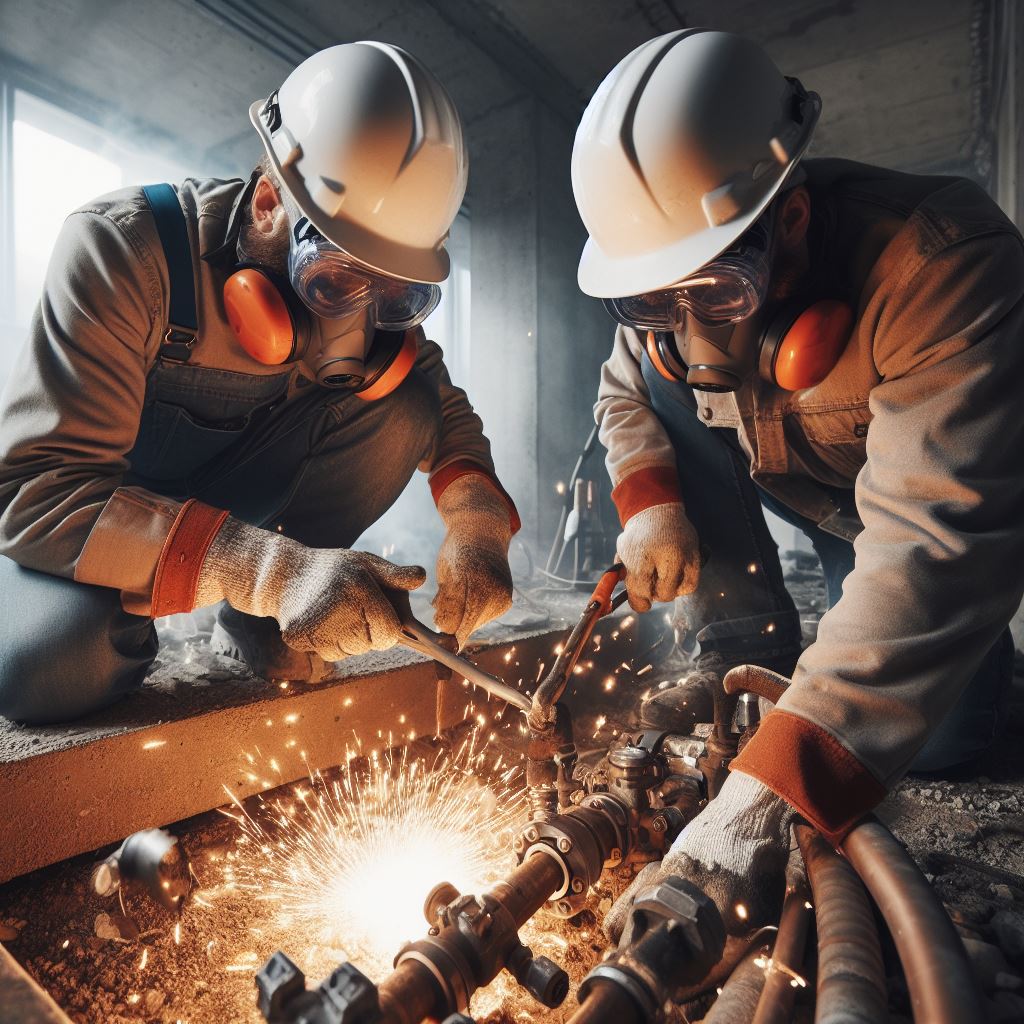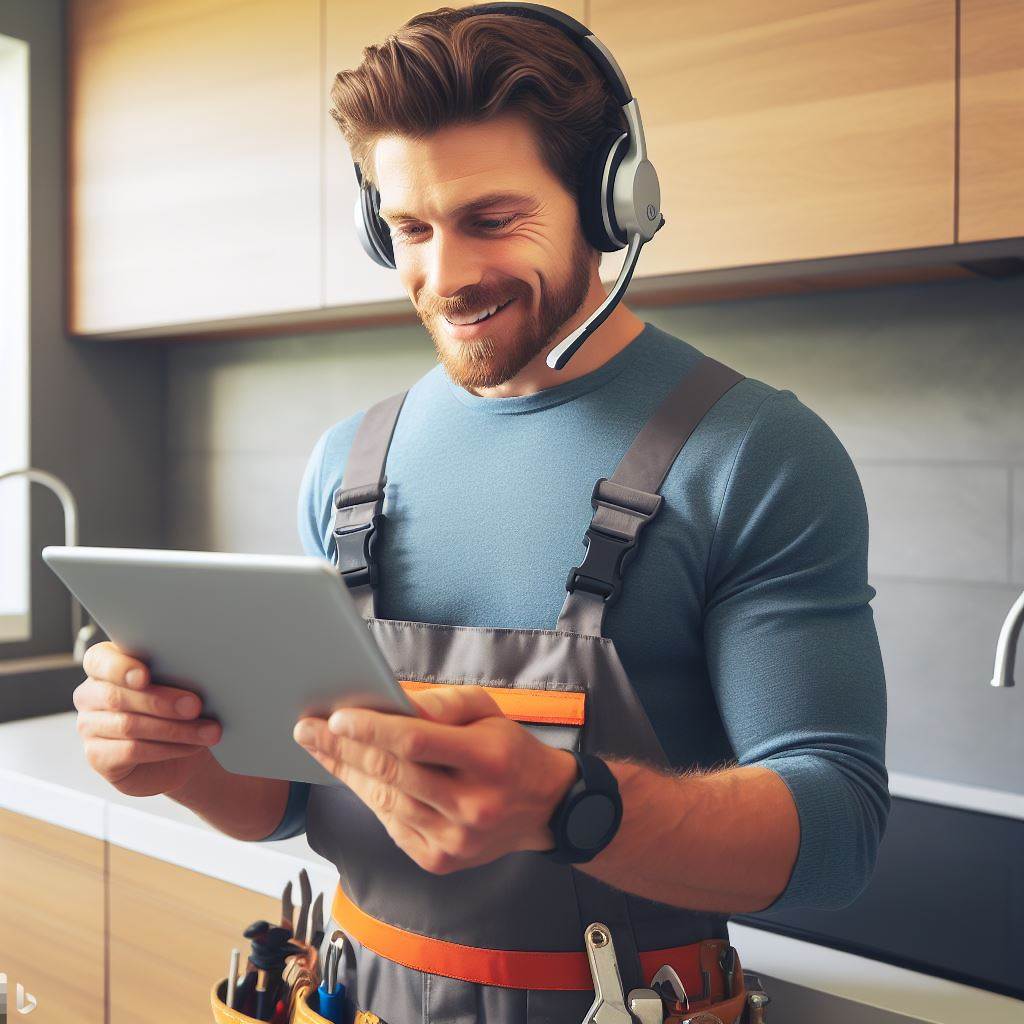Introduction
Plumber Role in Water Conservation and Sustainability and Sustainability are crucial for the future of our planet.
Every individual has a role to play, including US plumbers who have a significant impact on the conservation of this vital resource.
A brief explanation of the importance of water conservation and sustainability
Water conservation is essential to ensure a sustainable supply of clean water for current and future generations.
It helps safeguard ecosystems, supports agriculture, and addresses the needs of a growing population.
Without conservation efforts, we risk depleting our water resources and damaging the environment.
Statement of the topic: The Role of US Plumbers in water conservation and Sustainability
US plumbers play a vital role in achieving water conservation and sustainability goals.
Through their expertise and actions, they contribute to reducing water usage, preventing leaks, and promoting efficient plumbing systems.
Plumbers implement innovative technologies and educate communities about water-efficient practices, making a significant impact on the overall water conservation efforts.
Plumbers assess and upgrade plumbing systems to ensure they are water-efficient, replacing old fixtures with low-flow alternatives.
By doing so, they help save thousands of gallons of water each year.
Additionally, they specialize in detecting and repairing leaks, which can waste substantial amounts of water if left unaddressed.
Their ability to identify and fix leaks promptly prevents unnecessary water waste.
Furthermore, US plumbers educate the public on water-saving practices, such as using water-efficient appliances, capturing rainwater, and irrigating landscapes wisely.
Their outreach efforts contribute to raising awareness and inspiring responsible water use habits.
In short, US plumbers have a crucial role in water conservation and sustainability.
Through their expertise in promoting water-efficient practices, upgrading plumbing systems, and addressing leaks, they contribute to conserving this precious resource for a better future.
Overview of a Plumber’s Role in Water Conservation
Definition of a plumber’s job responsibilities
- Plumbers are skilled professionals who install, repair, and maintain water supply systems.
- They work with pipes, fittings, fixtures, and appliances to ensure efficient water distribution.
- A plumber’s duties also include the installation of wastewater disposal systems.
How plumbers directly impact water conservation efforts
- Plumbers play a crucial role in promoting and implementing water conservation practices.
- They help individuals and communities reduce water wastage.
- By properly installing and maintaining plumbing fixtures, plumbers ensure efficient water usage.
- They can recommend and install low-flow faucets, showerheads, and toilets to conserve water.
- Plumbers also assist in the installation of rainwater harvesting systems and greywater recycling systems.
Importance of plumbers’ expertise in identifying and fixing leaks
- One of the key skills of a plumber is the ability to detect and repair water leaks.
- Leak detection is crucial to prevent water loss and damage to property.
- Plumbers use specialized tools and techniques to locate hidden leaks in plumbing systems.
- By fixing leaks promptly, plumbers contribute to water conservation efforts and reduce water bills.
- Their expertise helps homeowners and businesses save both water and money.
Plumbers, unsung water conservation heroes, crucially shape society.
They install, repair, and maintain water supply and wastewater disposal systems, impacting conservation directly.
A plumber’s tasks span pipes, fittings, and fixtures, ensuring efficient water distribution.
Expertise extends to vital wastewater disposal systems, maintaining hygiene.
Transform Your Career Today
Unlock a personalized career strategy that drives real results. Get tailored advice and a roadmap designed just for you.
Start NowWithout plumbers, water and sanitation systems would falter.
Plumbers lead water conservation, curbing wastage through advice and efficient solutions.
They install water-saving fixtures like low-flow faucets, showers, and toilets, ensuring significant water savings without functionality compromise.
Plumbers also set up rainwater harvesting and greywater recycling systems, collecting rain for non-drinking purposes and reusing water from showers and sinks for irrigation or flushing.
Crucially, plumbers possess expertise to design and install systems, conserving otherwise wasted water. Identifying and fixing leaks, visible or hidden, is a plumber’s key skill.
Using specialized tools, plumbers detect leaks promptly, preventing water wastage and contributing to conservation.
This not only saves water but reduces costs for homeowners and businesses.
Essentially, Plumber Role in Water Conservation and Sustainability, covering installation, repair, and maintenance.
Through promoting efficient fixtures, water-saving tech, and leak fixes, they contribute to both individual and community-level conservation efforts.
Their expertise is vital for sustainable plumbing solutions, making them indispensable for a more water-efficient future.
Read: Plumbing Innovations: Modern Trends Taking the US By Storm
Water-Saving Plumbing Fixtures and Appliances
Description of various water-saving fixtures, such as low-flow toilets and faucets:
- Low-flow toilets: These fixtures use significantly less water per flush compared to traditional toilets.
- Low-flow faucets: These faucets restrict water flow while maintaining adequate pressure for daily use.
- Water-efficient showerheads: These fixtures reduce water consumption without compromising the shower experience.
- Greywater recycling systems: These systems collect and treat water from sinks, showers, and laundry for reuse in irrigation or flushing toilets.
How plumbers can help install and maintain these fixtures
- Plumbers are trained to assess water usage needs and identify appropriate water-saving fixtures.
- They can ensure correct installation and functioning, preventing leaks or water wastage.
- Periodic maintenance by plumbers can ensure optimal performance and longevity of water-saving fixtures.
Benefits of using water-saving plumbing appliances in terms of conservation and sustainability
- Conservation: Water-saving fixtures reduce water consumption, optimizing resource usage and mitigating water scarcity.
- Sustainability: By conserving water resources, these appliances contribute to a more sustainable future.
- Financial savings: Lower water usage results in reduced utility bills, providing financial benefits to households and businesses.
- Environmental impact: Reduced water consumption reduces the strain on local ecosystems and minimizes water treatment requirements.
- Public health: Water-saving fixtures can prevent excessive water use, maintaining adequate water supply for public health and hygiene.
Overall, the installation and use of water-saving plumbing fixtures and appliances play a crucial role in addressing water conservation and sustainability.
Plumbers have the expertise to guide individuals and businesses in choosing the most suitable fixtures, ensuring proper installation, and offering maintenance services.
By adopting these fixtures, society can contribute significantly to preserving water resources and building a more sustainable future for everyone.
Read: Celebrating Women and Diversity in the US Plumbing Field

Plumbing Inspections and Maintenance
Importance of regular plumbing inspections to detect leaks and inefficiencies
- Regular plumbing inspections are crucial to identify hidden leaks and inefficiencies.
- Leaks can waste thousands of gallons of water per year, leading to significant water wastage.
- Early detection and repair of leaks can help conserve water and prevent potential damage to the plumbing system.
- Plumbers have the expertise to thoroughly inspect the entire plumbing system and identify any leaks or inefficiencies.
- They use advanced tools and techniques to detect hidden leaks, such as infrared cameras and acoustic devices.
Steps plumbers take to identify and fix water-related issues
- Plumbers start by conducting a comprehensive examination of the plumbing system.
- They check for leaks, inspect pipe connections, and assess water pressure.
- If a leak is detected, plumbers determine its source and extent using specialized equipment.
- Fixing leaks often involves repairing or replacing faulty pipes, fixtures, or seals
- Plumbers ensure that all repaired areas are properly sealed and secured to prevent future leaks.
Examples of common plumbing problems that can lead to water wastage
- Dripping faucets: A single dripping faucet can waste hundreds of gallons of water in a year.
- Leaking toilets: Faulty flappers or fill valves can cause toilets to constantly leak water.
- Burst or leaking pipes: Corrosion, high water pressure, or freezing temperatures can lead to pipe failure.
- Leaky showerheads: Worn-out gaskets and seals can result in continuous water leakage during showers.
- Faulty irrigation systems: Malfunctioning sprinkler heads or valves can waste a significant amount of water outdoors.
Case studies or statistics highlighting the impact of plumbing maintenance on water conservation
- A study conducted by the Environmental Protection Agency found that fixing household leaks can save an average of 10,000 gallons of water per year.
- In Los Angeles, a water utility company reported that plumbing inspections and repairs helped save over 30 million gallons of water in a year.
- In a residential building complex, routine plumbing maintenance reduced water consumption by 20% within six months.
- Statistics show that regular maintenance and timely repairs can reduce water bills by up to 10%.
- Plumbing maintenance programs implemented in several cities across the United States have resulted in significant water conservation and sustainability.
Regular plumbing inspections and maintenance is crucial in Plumber Role in Water Conservation and Sustainability efforts.
By identifying and repairing leaks and inefficiencies, plumbers contribute to reducing water wastage and preserving this precious resource for future generations.
Read: Comparing Union vs. Non-Union Plumber Jobs in the US
Showcase Your Business Today
Reach thousands of readers actively exploring professional services. Publish your business profile and grow your audience now.
Publish NowEducation and Awareness
The role of plumbers in educating the public about water conservation
Plumbers play a vital role in educating the public about the importance of water conservation.
They have extensive knowledge about plumbing systems and can advise homeowners on effective water-saving practices.
Plumbers can educate the public about water conservation by explaining the benefits of using water-efficient fixtures and appliances.
They can highlight how these upgrades can significantly reduce water waste and lower utility bills.
In addition, plumbers can educate homeowners about the importance of regular maintenance to prevent water leaks.
By detecting and repairing leaks promptly, plumbers can help conserve water and prevent costly water damage.
Examples of educational initiatives by plumbers or professional plumbing associations
Many plumbers and professional plumbing associations are actively involved in educational initiatives aimed at promoting water conservation. Plumber Role in Water Conservation and Sustainability
These initiatives include workshops, seminars, and online resources that educate both professionals and homeowners.
For instance, some plumbing associations organize training programs for plumbers to enhance their knowledge of water-efficient technologies and practices.
These programs equip plumbers with the necessary skills to educate their customers about water conservation.
Plumbers also collaborate with local utility companies to conduct water conservation awareness campaigns.
They participate in community events, distribute informational brochures, and provide free consultations to homeowners on water-saving techniques.
Importance of raising awareness about water-saving practices through customer interactions
Raising awareness about water-saving practices through customer interactions is crucial for effective water conservation.
Plumbers, as trusted professionals, have direct access to homeowners and can make a significant impact.
By explaining the environmental and financial benefits of water conservation, plumbers can motivate homeowners to adopt water-saving practices.
They can recommend installing low-flow fixtures, such as low-flow showerheads and dual-flush toilets, which can greatly reduce water usage.
During routine plumbing services, plumbers can also educate homeowners on simple yet effective water-saving habits, such as turning off faucets while brushing teeth, fixing dripping faucets promptly, and using dishwashers and washing machines efficiently.
By emphasizing the importance of water conservation in maintenance and repair work, plumbers can encourage homeowners to prioritize water-saving initiatives.
These interactions can create a ripple effect, as homeowners share the knowledge with their friends and family.
Plumber Role in Water Conservation and Sustainability
Through educational initiatives, they can empower homeowners with the knowledge and tools to minimize water waste.
By raising awareness about water-saving practices during customer interactions, plumbers can contribute to a more sustainable future.
Read: The Intricacies of Plumbing Codes Across US States
You Might Also Like: The Environmental Impact of Welding in the USA: What’s Being Done?
Collaboration with Water Conservation Organizations and Initiatives
Examples of partnerships between plumbers and environmental organizations
- Plumbers working together with local conservation groups to promote water-saving techniques.
- Partnerships with non-profit organizations like Green Plumbers USA that focus on sustainable plumbing practices.
- Collaborations with water utility companies to educate the public on water conservation.
Collaborative efforts and projects aimed at promoting sustainable water usage
- Plumbers and conservation organizations teaming up to offer free water audits to households.
- Joint initiatives to install water-efficient fixtures, such as low-flow toilets and faucets, in public buildings.
- Participation in community workshops to teach residents about water-saving strategies.
Benefits of such collaborations for both plumbers and the larger community
- Increased awareness about the importance of water conservation among the general public.
- Access to resources and expertise in sustainable plumbing practices for plumbers.
- Creation of a network where professionals can exchange knowledge and learn from one another.
- Enhanced reputation for plumbers as environmentally-conscious and socially responsible professionals.
- Cost savings for residents through reduced water bills due to efficient plumbing installations.
Conclusion
Recap of the plumber’s role in water conservation and sustainability
Plumber Role in Water Conservation and Sustainability by fixing leaks, installing efficient fixtures, and promoting responsible water usage.
Call-to-action for readers to consider the impact of their plumbing choices on water conservation
It is important for every individual to think about their plumbing choices and how they can contribute to water conservation efforts.
Final thoughts on the importance of recognizing and supporting plumbers in their efforts:
Plumbers are unsung heroes in the battle against water waste, and their skills and expertise should be acknowledged and supported for a sustainable future.
[E-Books for Sale]
The Big Book of 500 High-Paying Jobs in America: Unlock Your Earning Potential
$19.99 • 500 High-Paying Jobs • 330 pages
Explore 500 high-paying jobs in America and learn how to boost your career, earn more, and achieve success!
See All 500 High-Paying Jobs of this E-Book
1001 Professions Without a Degree: High-Paying American Jobs You Can Start Now
$19.99 • 1001 Professions Without a Degree • 174 pages
Discover 1001 high-paying jobs without a degree! Unlock career tips, skills, and success strategies for just $19.99!




